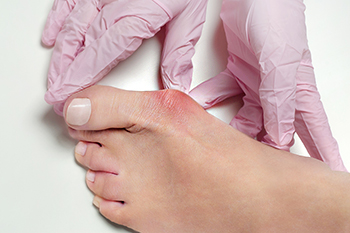
People who have bunions report it can be one of the most painful foot conditions to have. It is defined as a bony protrusion that forms on the side of the big toe, and will gradually become larger if treatment is not received. A bunion can be caused by genetic reasons, or from wearing shoes that have a tapered toe area. High heels can fit into this category, and it is beneficial to choose shoes that have a lower heel if these types of shoes need to be worn. Corns and calluses may form on top of the toes, as they touch the top of the shoe. This can be uncomfortable, and mild relief may be felt when the shoes that are worn can accommodate the bunion. If the bunion becomes severe and causes the inability to complete daily activities, surgery may be an option to consider for removal and permanent relief. If you see a bunion that is starting to form, it is suggested that you contact a podiatrist who offers you treatment options that are right for you.
If you are suffering from bunion pain, contact Dr. Harry I. Zirna of Lockport Foot Care, PLLC. Dr. Zirna can provide the care you need to keep you pain-free and on your feet.
What Is a Bunion?
Bunions are painful bony bumps that usually develop on the inside of the foot at the joint of the big toe. As the deformity increases over time, it may become painful to walk and wear shoes. Women are more likely to exacerbate existing bunions since they often wear tight, narrow shoes that shift their toes together. Bunion pain can be relieved by wearing wider shoes with enough room for the toes.
Causes
- Genetics – some people inherit feet that are more prone to bunion development
- Inflammatory Conditions - rheumatoid arthritis and polio may cause bunion development
Symptoms
- Redness and inflammation
- Pain and tenderness
- Callus or corns on the bump
- Restricted motion in the big toe
In order to diagnose your bunion, your podiatrist may ask about your medical history, symptoms, and general health. Your doctor might also order an x-ray to take a closer look at your feet. Nonsurgical treatment options include orthotics, padding, icing, changes in footwear, and medication. If nonsurgical treatments don’t alleviate your bunion pain, surgery may be necessary.
If you have any questions, please feel free to contact our offices located in Lockport, NY . We offer the newest diagnostic and treatment technologies for all your foot care needs.
